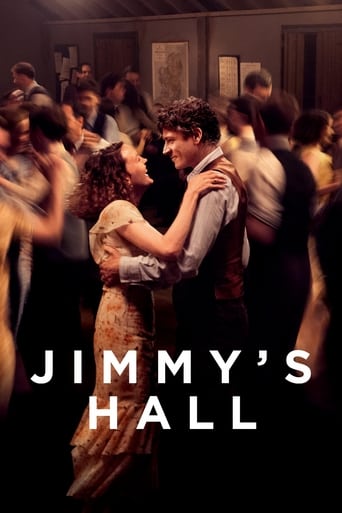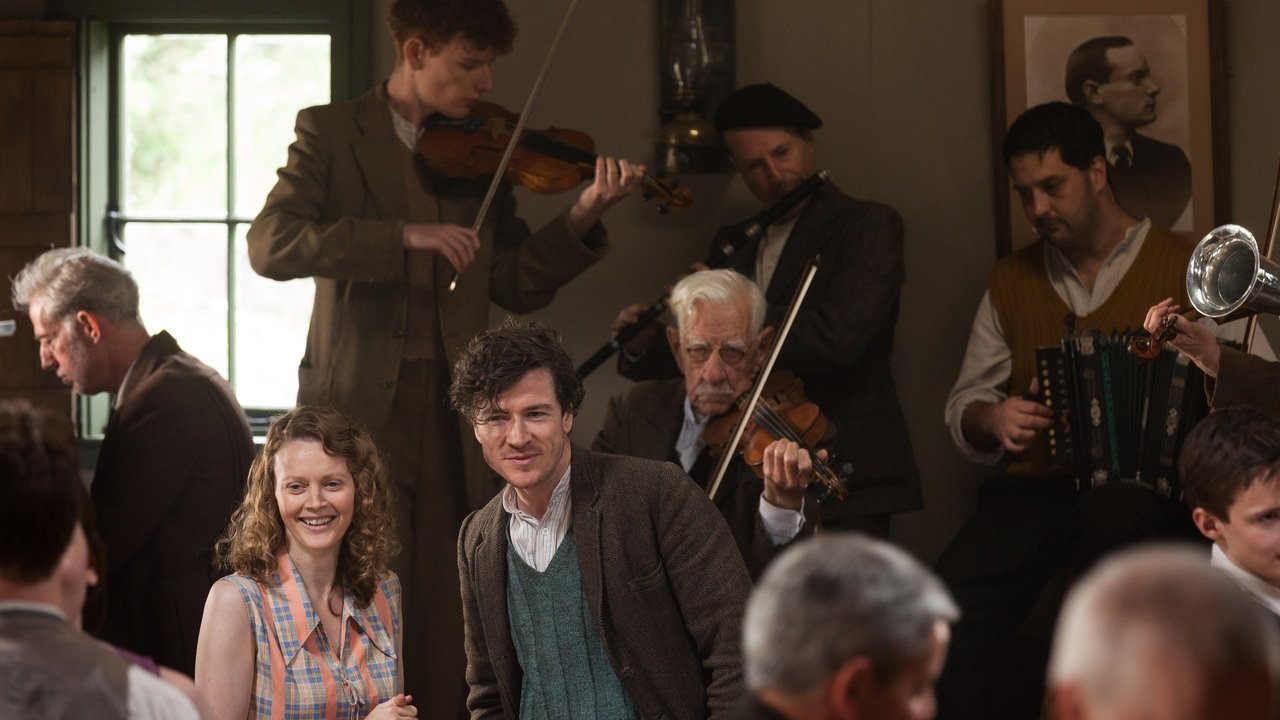Martin Bradley
At his best Ken Loach makes films that are as emotionally engaging as any in world cinema and while he has on occasions disappointed, every Ken Loach film is worth seeking out. "Jimmy's Hall" sees him return, in some respects, to the territory he explored in "The Wind that Shakes the Barley" and it is one of his very best films. Again we are back in Ireland but 10 years after the end of the Civil War. Old wounds haven't healed, (they still haven't healed completely to this day), and like "The Wind that Shakes the Barley" the divisions here are much more political than social and almost as violent.It deals with the very specific conflict between those who opposed the Treaty, those who supported it and the dominating Catholic Church when one, Jimmy Gralton, returns from 10 years exile in America and reopens a community hall that was the source of all his trouble in the first place, against the express wishes of 'Holy Mother Church' and those who backed it.As scripted by Paul Laverty it is, of course, a deeply political film but Loach is the most humanist of political film-makers; consequently it is also a deeply moving (and, at times, very funny) picture. At its centre is a magnificent performance from Barry Ward as Gralton and he is backed beautifully by Jim Norton and Andrew Scott representing the clergy as well as a host of wonderfully naturalistic Irish actors, some professional, some not. Loach may now be in this seventies but this feels as fresh and as relevant as anything he did fifty years ago. I think it's the equal to both "Land and Freedom" and "The Wind that Shakes the Barley".
Paul Allaer
"Jimmy's Hall" (2014 release from Ireland/UK; 109 min.) brings the true story of what happened to Jimmy Gralton upon his return to Ireland in 1932. the movie's opening titles are accompanied by archive footage of New York in the late 20s/early 30s. As the movie opens, we are told it is "County Leitrim, Ireland, 1932", and we see Jimmy coming back to Ireland after 20 years in New York (presumably because of the Depression and related unemployment). It's not long before Jimmy and his friends decide to renovate the Pears-Connelly Hall, so as to give young people and the community a place to gather for dancing, reading, drawing, singing, etc. (we would call it a "community rec center" these days). This does not sit well with the local priest, who claims 'exclusivity' for all things that could be deemed educational, nor are the local landlords pleased. At this point we are 15 min. into the movie, but to tell you more would spoil your viewing experience, you'll just have to see for yourself how it all plays out.Couple of comments: this is the latest movie be legendary British director Ken Loach, now a crisp 79 years young (and similar to Woody Allen in his never-ceasing output). Loach is well-known for using his films as social commentary, and "Jimmy's Hall" is no exception. For me, that is not an issue, and Loach has made a number of stunningly beautiful and captivating movies over the years. Hence I was ready to like "Jimmy's Hall" very much. Alas, it was not to be, for several reasons: first, the movie is not very helpful to let us understand why certain factions take a particular position (we are never told what beef the landlords have with Jimmy and his friends) or why the issue of the land ownership matters initially, and then a bit later on it doesn't. But the biggest disappointment I have with the film is that at no point did I become emotionally invested in any of the main characters. Yes the local priest is easy to loathe, and we all do, but we are not given a chance to really buy in to Jimmy, or his friends, or his romantic interest. It all just happens, for seemingly no reason. If this was a fictional story, I'd have walked out an hour into the movie, but since this movie is "inspired by the life and times of Jimmy Gralton" (as is announced at the beginning of the movie), I wanted to find out how it would all unfold. There are some fine performances, but I found the chemistry between Jimmy (played by Barry Ward) and his romantic interest (played by Francis Magee) completely lacking and unconvincing. Last but certainly not least, there is a very nice musical score to the movie, featuring both traditional Irish music and jazz from the 20s and 30s.I had seen the trailer for "Jimmy's Hall" a few times and was really looking forward to this. "Jimmy's Hall" finally opened this weekend at my local art-house theater here in Cincinnati. The early evening screening where I saw this at was attended okay but not great (I counted 12 people, including myself, of which one walked out halfway through and didn't come back). As much as I like Ken Loach, this is not none of his best, I'm afraid. But I certainly encourage you to check it out, be it in the theater, on Amazon Instant Video, or eventually on DVD/Blu-ray, and draw your own conclusion about "Jimmy's Hall".
eyeintrees
There are many movies made about oppression, but not nearly enough. In this story based on facts and one man's intention to give culture, song and dance to his small, impoverished community, it defies belief that this travesty of injustice occurred.As usual, the Catholic Church, the overlords and the unjust legal system come together to destroy any chance a small community has of the vital birth-right of culture and harmony for those who need it most; an isolated county in Ireland.As one man steps up, after having been deported once already for the grand crime of opening a hall where people can learn such basic things as song, dance, art, literature and boxing, after his ten first ten year deportation, the local youth who have nothing to look forward to in life, convince him to do so again.This is a straightforward movie about a circumstance that defies belief, and yet it occurred. Worth the watch for anyone who understands that oppression and fascism is wrong and that normal people deserve joy, community and to fight back when their world makes no sense on account of simply wanting to life a life.
drbits
This story highlights the struggle for individual respect and liberty that has been going on since the reformation. Today, people often attach words communist or socialist to the struggle of the individual. This film reminds us of the other side of the story: greed and power are the feudal and capitalist side of the story.One flaw in the movie is that people assume the struggle between Jimmy and the priest is communism versus the church. But Jimmy was not a communist. Jimmy was a grass-roots liberal who supported his community and occasionally spoke out against the concentration of power. The church represents this concentration of power and the struggle to maintain the concentration of power.During the 1920's, a large percentage of the world's "Wealth" was tied up in speculative investments. Corrupt politicians sided with the land holders and the "Robber barons". By 1924, economic experts started to announce that unfettered greed would lead to an economic crisis in the USA and Europe. In 1929, the US stock-market crash vaporized much of the world's wealth and centralized power among an even smaller percentage of the population.The movie includes a lot of history that most people in the US and UK who were born before 1977 already know. However, for most of the world, the Irish history and the extent of the struggle between the rich and poor during those times is new.This struggle continues today. Instead of hereditary land owners, we have large banks and other institutions that "influence" most of the world's "capitalist" governments. The government favors for corporations and privatization of government services that starting in the late 1970's continues to this day and is responsible for the depression of 2008.Without government support for those who were thrown into poverty, the 2008 depression would have been as bad as the 1929 depression. I think the writers were trying to remind us about the consequences of unfettered greed.


 AD
AD



